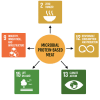Microbial Proteins: A Green Approach Towards Zero Hunger
- PMID: 40807573
- PMCID: PMC12346714
- DOI: 10.3390/foods14152636
Microbial Proteins: A Green Approach Towards Zero Hunger
Abstract
The global population is increasing rapidly and, according to the United Nations (UN), it is expected to reach 9.8 billion by 2050. The demand for food is also increasing with a growing population. Food shortages, land scarcity, resource depletion, and climate change are significant issues raised due to an increasing population. Meat is a vital source of high-quality protein in the human diet, and addressing the sustainability of meat production is essential to ensuring long-term food security. To cover the meat demand of a growing population, meat scientists are working on several meat alternatives. Bacteria, fungi, yeast, and algae have been identified as sources of microbial proteins that are both effective and sustainable, making them suitable for use in the development of meat analogs. Unlike livestock farming, microbial proteins produce less environmental pollution, need less space and water, and contain all the necessary dietary components. This review examines the status and future of microbial proteins in regard to consolidating and stabilizing the global food system. This review explores the production methods, nutritional benefits, environmental impact, regulatory landscape, and consumer perception of microbial protein-based meat analogs. Additionally, this review highlights the importance of microbial proteins by elaborating on the connection between microbial protein-based meat analogs and multiple UN Sustainable Development Goals.
Keywords: UN sustainable development goals; food security; meat alternatives; microbial proteins; sustainable protein sources.
Conflict of interest statement
The authors declare that there are no conflicts of interest.
Figures






Similar articles
-
Prescription of Controlled Substances: Benefits and Risks.2025 Jul 6. In: StatPearls [Internet]. Treasure Island (FL): StatPearls Publishing; 2025 Jan–. 2025 Jul 6. In: StatPearls [Internet]. Treasure Island (FL): StatPearls Publishing; 2025 Jan–. PMID: 30726003 Free Books & Documents.
-
Short-Term Memory Impairment.2024 Jun 8. In: StatPearls [Internet]. Treasure Island (FL): StatPearls Publishing; 2025 Jan–. 2024 Jun 8. In: StatPearls [Internet]. Treasure Island (FL): StatPearls Publishing; 2025 Jan–. PMID: 31424720 Free Books & Documents.
-
Constraints and Prospects of Improving Cowpea Productivity to Ensure Food, Nutritional Security and Environmental Sustainability.Front Plant Sci. 2021 Oct 22;12:751731. doi: 10.3389/fpls.2021.751731. eCollection 2021. Front Plant Sci. 2021. PMID: 34745184 Free PMC article. Review.
-
Systemic pharmacological treatments for chronic plaque psoriasis: a network meta-analysis.Cochrane Database Syst Rev. 2020 Jan 9;1(1):CD011535. doi: 10.1002/14651858.CD011535.pub3. Cochrane Database Syst Rev. 2020. Update in: Cochrane Database Syst Rev. 2021 Apr 19;4:CD011535. doi: 10.1002/14651858.CD011535.pub4. PMID: 31917873 Free PMC article. Updated.
-
Systemic pharmacological treatments for chronic plaque psoriasis: a network meta-analysis.Cochrane Database Syst Rev. 2017 Dec 22;12(12):CD011535. doi: 10.1002/14651858.CD011535.pub2. Cochrane Database Syst Rev. 2017. Update in: Cochrane Database Syst Rev. 2020 Jan 9;1:CD011535. doi: 10.1002/14651858.CD011535.pub3. PMID: 29271481 Free PMC article. Updated.
References
-
- United Nations Organization World Population Projected to Reach 9.8 Billion in 2050, and 11.2 Billion in 2100. 2017. [(accessed on 1 April 2025)]. Available online: https://www.un.org/en/desa/world-population-projected-reach-98-billion-2....
-
- Hwang Y.H., Samad A., Muazzam A., Alam A.M.M., Joo S.T. A Comprehensive Review of AI-Driven Approaches to Meat Quality and Safety. Food Sci. Anim. Resour. 2025;45:998–1013. doi: 10.5851/kosfa.2025.e32. - DOI
-
- Maja M.M., Ayano S.F. The impact of population growth on natural resources and farmers’ capacity to adapt to climate change in low-income countries. Earth Syst. Environ. 2021;5:271–283. doi: 10.1007/s41748-021-00209-6. - DOI
-
- Talib A., Samad A., Hossain M.J., Muazzam A., Anwar B., Atique R., Hwang Y.-H., Joo S.T. Modern trends and techniques for food preservation. Food Life. 2024;2024:19–32. doi: 10.5851/fl.2024.e6. - DOI
-
- Samad A., Kim S., Kim C.J., Lee E.Y., Kumari S., Hossain M.J., Alam A.N., Muazzam A., Bilal U., Joo S.T., et al. Revolutionizing cell-based protein: Innovations, market dynamics, and future prospects in the cultivated meat industry. J. Agric. Food Res. 2024;18:101345. doi: 10.1016/j.jafr.2024.101345. - DOI
Publication types
Grants and funding
LinkOut - more resources
Full Text Sources

